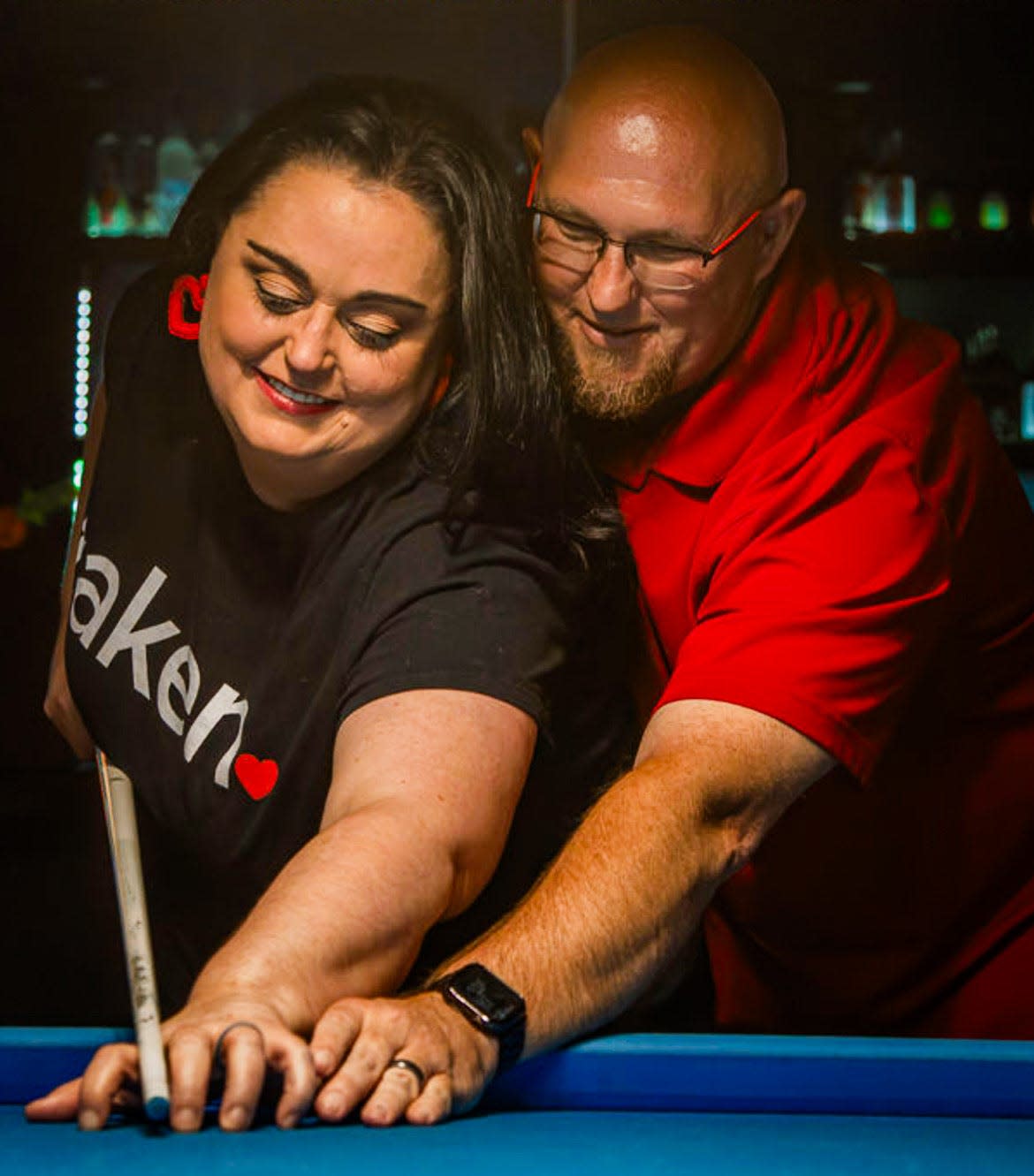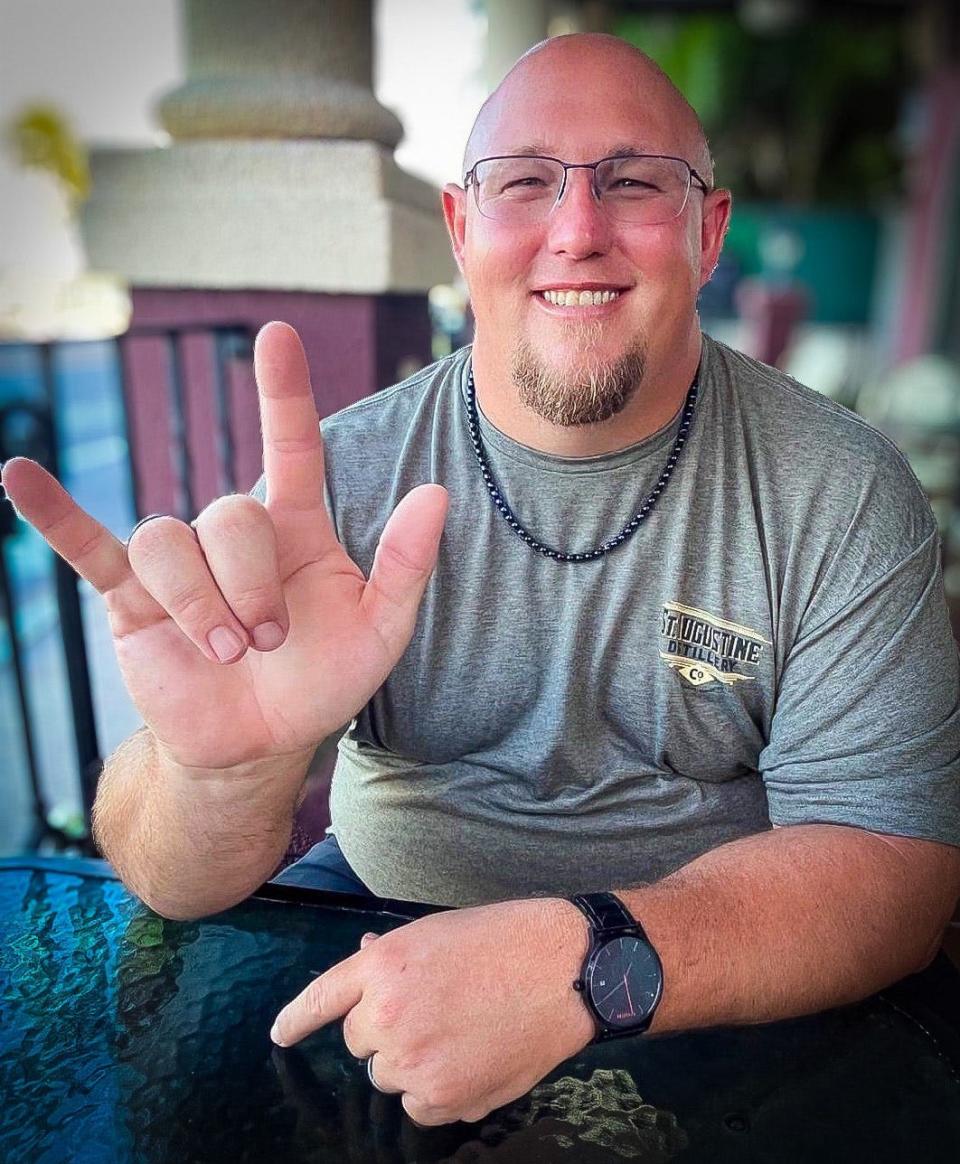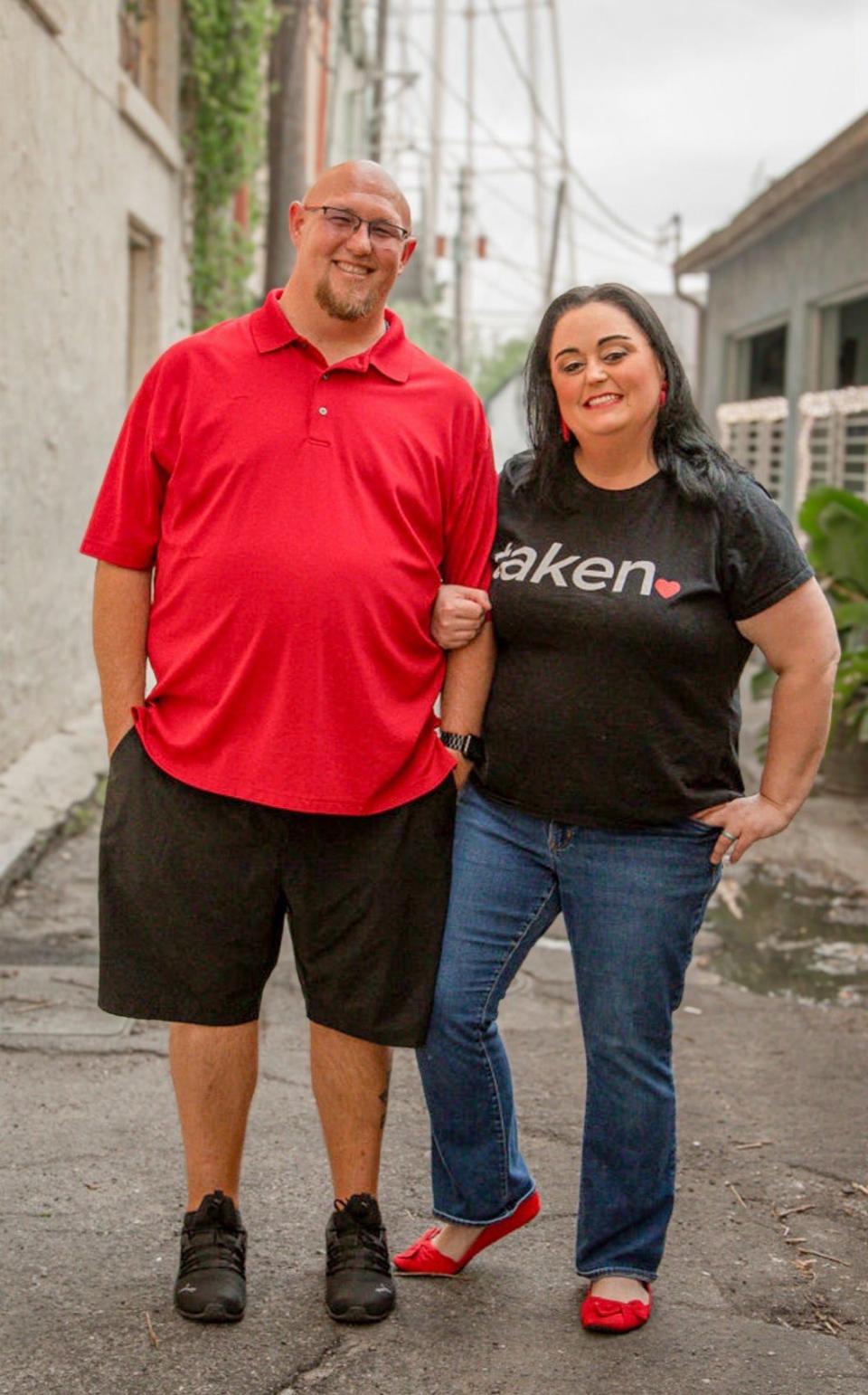Wife on a mission: Polk woman refuses to 'wait-and-see' on husband's kidney transplant

For Ed Strickler, life has imposed a series of waits.
Strickler learned in childhood that he faced the possibility of developing polycystic kidney disease, a potentially deadly ailment passed down genetically. About age 30, he received confirmation of the disease.
For more than a decade, Strickler, now 42, has waited for his kidneys to decline to the point that he would need a transplant.
A doctor told Strickler’s wife, Nancy, that nothing could be done until testing showed his kidney function had slipped to 20%. But Nancy is not inclined to accept passively waiting.
“They keep telling me, ‘You have to do a wait-and-see thing,’” Nancy said. “And I'm like, ‘No, we're just going to get everything lined up and set up and ready to go, so when you finally tell us it’s a yes, we're not at that point trying to scramble to do everything that we've accomplished in the last six months.’”
Nancy’s self-imposed role is summed up in a header on the website she created to prepare for Ed’s needed kidney transplant through seeking potential donors and raising money to help cover the considerable costs. It reads, “Wife on a mission.”
What is polycystic kidney disease?
Polycystic kidney disease, or PKD, causes dark, fluid-filled cysts to grow in the kidneys. In describing the disease, Nancy Strickler said that a kidney can swell to the size of a football and weigh as much as 30 pounds, whereas a normal kidney is roughly fist-sized and weighs less than one pound.
The cysts can slowly replace much of the kidneys, reducing kidney function and causing kidney failure. When healthy, kidneys remove waste products and excess fluid from the body, regulate levels of salt and other compounds, help produce red blood cells and maintain blood pressure.
About 600,000 Americans have PKD, the fourth leading cause of kidney failure, according to the National Kidney Foundation. There is no known cure for the disease, and research on treatments is in the early stages.

The disorder is inherited, with either a 25% or 50% chance of a parent carrying the abnormal gene passing on to a child.
Ed Strickler’s mother developed PKD and received a kidney transplant in the 1980s. She later developed lymphoma, and the cancer treatments caused such damage to her liver that she died in 2002, Ed said.
Ed’s older brother waited 10 years before receiving a kidney transplant from a deceased donor, Nancy said. After five years on the transplant list, Ed’s older sister accepted a kidney from a living donor. Both are alive and in good health, she said.
The family risk, then the diagnosis
Ed, a Pennsylvania native, knew that his family history put him at risk for developing PKD. As he neared 30, Nancy began pressing him to seek a medical check. The couple, married in 2007, moved from New Jersey to Florida in 2011, as Ed joined the initial workforce at Legoland Florida Resort in Winter Haven.
After the couple had gotten settled in Polk County, Ed assented to having a kidney screening. The most common method of checking for PKD is an ultrasound, a test that uses sound waves to form pictures of internal structures.
The doctor who reviewed the images informed Ed that one of his kidneys had swelled significantly. He is now listed in stage 4 renal failure.
Ed works as a ride supervisor at Legoland, a job that involves walking the theme park while carrying a heavy toolkit. The disease has caused him abdominal pain and other problems, Nancy said, with the symptoms increasing in the past year.
“He gets tired a lot easier than he used to,” Nancy said. “This is a man that, when I first met him, he liked to stay up all night, hanging out with his friends, go do like a 20-hour shift and stay out part of the night before he even went to bed. And now he is not like that at all.”
These days, Nancy sometimes notices Ed dozing when they are out for dinner. She said he also has some digestive problems.
The couple have been making regular trips to Mayo Clinic in Jacksonville, the facility that will oversee his transplant. During the visits, made every two or three months, he undergoes imaging tests, bloodwork and tests of renal function.
'You don't know what to root for'
Doctors have told Ed that he is not eligible to go on the transplant list until his kidney function drops to 20%. About a year and a half ago, tests rated his kidney function at 42%, Nancy said. At that point, a doctor estimated that he was three or four years away from having to worry about a transplant.

During a checkup in October, Ed learned that his kidney function had declined to 24%. Nancy recalled that her husband endured two cases of COVID since the 42% diagnosis, and she wonders if those infections accelerated the PKD process.
Ed was hospitalized in December, and testing revealed further deterioration in his kidney function. He returned to the Mayo Clinic in early April, and doctors determined his kidney function to be 24%.
The couple are now “in a little bit of a limbo” as Ed’s level fluctuates between 23% and 25%, Nancy said. She finds herself with conflicted feelings.
“It’s kind of like saying, ‘Come on, get to 20%,’ but then you're like, ‘No, don't get to 20%,’ because that's quicker, and he needs to keep his kidneys as long as he can,” Nancy said. “You’re in that limbo and you’re torn — like, you don't know what to root for, you know?”
Three levels of testing for a kidney match
As part of the limbo condition, doctors must wait until Ed hits the 20% mark and joins a kidney transplant list before they conduct the detailed testing that helps determine whether a potential donor is a strong match. The preparation involves three levels of testing, according to Mayo Clinic, starting with blood typing.
Results are best when a donor has the same blood type as the recipient or a compatible type. Nancy said that she is not a direct match for Ed because they have different blood types.
Tissue typing, comparing genetic markers through human leukocyte antigen testing, reveals how likely it is that the recipient’s body will reject the donated kidney.
In the third stage of testing, crossmatch, small blood samples from the potential donor and patient are mixed to test for the development of antibodies, indicating a possible negative reaction.
Though a kidney can be harvested from a donor soon after death, the results are usually much better with live transplants.
The National Kidney Registry, a nonprofit based in Connecticut, supports a “paired donation” option that improves the odds of finding a match. If the person needing a kidney has a willing donor who is not a good match, the NKR arranges for another patient to receive the kidney and swaps an organ from another donor.
Ed hopes to receive a transplant before his kidney function declines to the point that he must go on dialysis, the use of a machine that performs some of the functions of the kidneys. The treatment can yield a range of unpleasant side effects.
“I'm excited for the whole process to be over,” Ed said by phone from Jacksonville. “But I'm nervous because I don't know what comes afterward. I don't know how my body’s going to react. So a little bit of both.”
Wife on a mission
During a visit to Mayo Clinic, Nancy said, a doctor told her that everything was on hold until Ed reaches the 20% mark and joins the transplant list.
“And I'm looking at him like, ‘You don't know me,’” she said.
Nancy took control of the preparations, first by focusing on Ed’s health. Though physically active, he was overweight, with a body-mass index that threatened to disqualify him from making the transplant list.
“I looked at Ed and I said, ‘I love you, honey, but say goodbye to everything,’” she recalled with a laugh. “There goes his beer. There went his burgers. There goes everything. I'm proud to say that even Ed got on board with it after kicking and screaming a bit. I'm proud to say that Ed is now 50 pounds lighter and now is very much eligible for the national kidney list.”
Nancy, who is pursuing a master’s degree in marketing, then concentrated on publicizing Ed’s plight, largely out of a desire to line up potential kidney donors. She created a website, www.kidneyfored.org, and began promoting Ed’s quest for a kidney on Facebook, Instagram and TikTok.
Nancy organized a recent fundraiser, an 80’s-themed, murder-mystery party, held at Tanner’s Lakeside Restaurant in Winter Haven.
“He’s the love of my life. Why would I not?” Nancy said of her campaign to support Ed.
Money is a concern, as the couple will face expenses and a loss of income before and after the transplant. Mayo Clinic requires organ recipients to remain in the vicinity of the office for 30 days after the transplant — or longer, if complications arise.
Doctors have estimated that Ed could be out of work for four to eight months, Nancy said. After a transplant, Ed would need medication to suppress his immune system, reducing the risk that his body rejects the new kidney.
“I took a vow, ‘til death do us part, in sickness and health – that’s my vow,” Nancy said. “So I'm going to go to the ends of the earth and back. Ed’s lucky. I don't mean what I'm about to say negatively, because we kind of joke about it. But I'm like, ‘You're lucky that I’m a loudmouth, because I'm making sure that people know your story.’”
Ed appreciates his wife’s strenuous efforts on his behalf.
“She's doing awesome,” he said. “I couldn't be happier about everything that she's doing.”
Gary White can be reached at gary.white@theledger.com or 863-802-7518. Follow on X @garywhite13.
This article originally appeared on The Ledger: Haines City couple takes team approach toward man's kidney transplant

